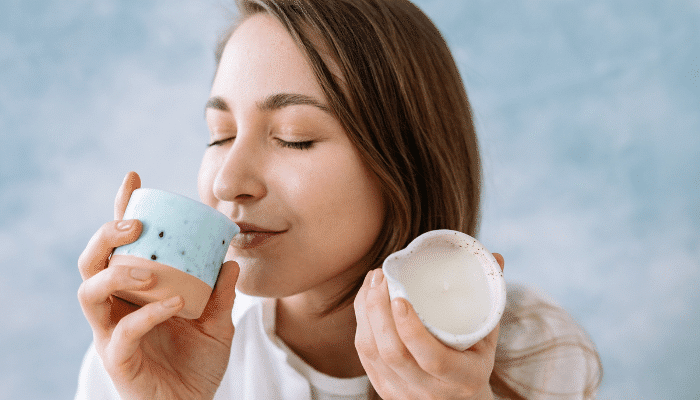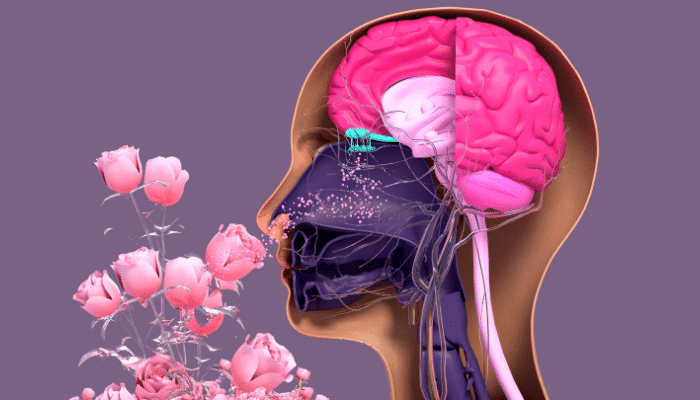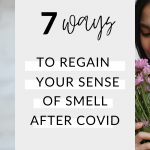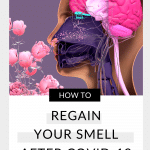

Disclosure: Some of the links in this article are affiliate links, which means that if you purchase through those links I will receive a small commission. For example, as Amazon Associate, I earn from qualifying purchases. If you decide to use these links, thank you!
The coronavirus has had a massive impact on our society. It has changed social constructs, our ability to travel, and how we see the world. In addition to the ways COVID-19 has impacted our world as a whole, it has affected us physically, some more than others.
One of the most common, long-lasting symptoms of COVID-19 is smell dysfunction. In fact, 50-75% of those who test positive experience loss of smell (also known as anosmia). It’s also common for COVID to cause parosmia (things that normally smell pleasant now smell foul).
And while 90% of patients regain their sense of smell after four to six weeks, some are still waiting 6 months to 2 years for it to return. Fortunately, there are a few science-backed ways to naturally regain your sense of smell after COVID.
Although the mechanisms are not fully understood, there is an emerging consensus that smell loss occurs when the coronavirus infects cells that support neurons in the nose (source). In addition, a research team in Italy showed that inflammation in the olfactory bulbs may be the culprit.

I have used medical journals and reputable websites to narrow down the information for you. Let’s explore the potential remedies for loss of smell.
A 2021 study found that zinc therapy may play a significant role in shortening the duration of smell loss. The median duration of recovery of olfactory function was 7 days (range 5–9 days) in COVID-19 patients who received zinc therapy which was significantly lower than in those who did not receive therapy.
As you know, the sense of smell and memory are irrefutably linked. Perhaps, by stimulating a memory through an aroma, you can boost your brain to reconnect the neural pathways that allow you to process and know the smell.
Not only can they help heal the olfactory senses, but we can heal through aromatherapy in many other ways, including alleviating depression, stress, or headaches.
Essential oils also heal through the antiviral and anti-inflammatory effects of the plants’ constituents for all kinds of ailments.
Studies on using essential oils show that this is a helpful method for healing anosmia. But, how do you smell train?
Smell Training Tips

One may also regain a sense of smell with natural methods aside from smell training.
This option is certainly worth a try. Castor oil comes from the castor bean and has been used to heal many different ailments for hundreds of years. This is due to the ricinoleic acid present.
Ricinoleic acid can heal infections. Plus, castor oil can heal inflammation of the nasal passageways of those suffering from cold-like symptoms.
Place two drops of gently warmed castor oil in each nostril twice daily. You want to do it after you wake and right before sleep.
I recommend using a massage oil for this. Take an essential oil of your choice (preferably orange or ginger and rose) and a carrier oil (coconut, almond, sunflower, etc.).
Place the oil near your nostrils and rub until it absorbs into your skin. Then, begin massaging the nostrils from the outside. This can help open up the nerves of the nose.
Softly massage the bridge of your nose with your thumb and forefinger for at least 5 minutes. Gently squeeze your nasal bones as you massage. Rub your sinuses as well. Avoid your eyes.
You can use a neti pot to rinse saline solution through your nasal passageways. It feels a little strange but works really well. It’ll help you clear out extra gunk and get it away from your sinuses.
You can also use a squeeze bottle or syringe to rinse. Regardless of the method, the process is simple.
Tilt your head and insert water, allow it to drip out of your mouth and the other nostril. Repeat on the other side.
Use about 1/2 cup water on each side or until you feel your sinuses are clear.
You can make a saline solution by combining 1/2 teaspoon salt and 1/2 a teaspoon baking soda with 1 cup of previously boiled water.
You boil the water to make sure it is sterile. DO NOT PUT BOILING HOT WATER IN YOUR NOSE.
For one, the spicy aroma of ginger can help stimulate your nervous system to send signals from your nose to your brain to allow for smell recognition.
Two, ginger has long been touted for its anti-inflammatory and astringent properties.
Anti-inflammatory means it can help open up your nasal passageways. The astringency of ginger helps dry out the mucus that may be blocking your ability to smell.
You can buy ginger tea bags in almost any grocery store.
My recipe for fresh ginger tea:
The recipe above is technically called a decoction which is the most medicinal way to ingest roots – ginger is a root.
My final suggestion is to use an oil diffuser to help your body heal. Blend your favorite oils to stimulate your senses. You can also blend rose and eucalyptus or frankincense and lemon.
Aromatherapy works best when we use conservative amounts of oil. The amount of oil you use is based on the size of your diffuser.
Your diffuser should come with instructions on how many drops to add. Fill it with water, add your essential oils, and relax knowing that you are healing yourself, even if you cannot actively smell.
The olfactory hues of our life create so much color and joy. The smell of baking cookies may remind you of your grandmother, or the smell of salt air may remind you of a precious moment you spent at the beach. This is not a sense you want to lose.
With this information, you are now ready to nurture and nourish your senses. I truly hope these tips, tricks, and valuable information will aid you in your journey.
May you be well. May you be happy. May you be healthy and safe.
*Please note that the information in this blog post should not be used to diagnose, treat, prevent or cure any disease or condition. This information is not a substitute for medical advice from your health care professional. For more details see my medical disclaimer here.

Allison Coulter is a writer, herbalist, musician, farmer, and lover of nature. She is an avid traveler and backpacker, having traveled throughout most of the United States as well as parts of Asia and Europe. She has lived in Hawaii, Philadelphia, New Jersey, Boston, and California.
Allison is always growing her knowledge on wellness, herbalism, meditation, and yoga. She believes life is to be full of courageous adventure while maintaining mental, spiritual, and physical health. Environmentalism is at the heart of her values.
You can find Allison on Instagram @greenwitchrevolution

